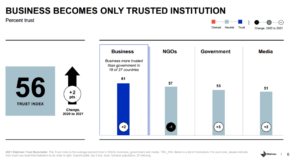If you’re a business owner, you likely know that trust plays a big factor in your sales – trust in your business, trust in your products, and trust built by reviews and testimonials left on sites like Google My Business or shared on social media. But how can you build and harness this trust factor? The Edelman Trust Barometer offers some clues.
The Edelman Trust Barometer
Edelman recently released their 2021 Edelman Trust Barometer; stats which are pulled from a survey issued to more than 33,000 respondents in 28 countries. While trust, on the whole, has declined, largely due to the pandemic and the public being unsure of what information they can trust and from where, the good news is that for businesses, the trust index has actually increased.
Out of the four institution types included in the survey – Business, Non-Government Organizations (NGOs), Government, and Media – business is the only one that scored high enough to be classified as “Trusted”.
 “While the world seems to be clouded by mistrust and misinformation, there is a glimmer of hope in business. This year’s study shows that business is not only the most trusted institution among the four studied, but it is also the only trusted institution with a 61 percent trust level globally, and the only institution seen as both ethical and competent.”
“While the world seems to be clouded by mistrust and misinformation, there is a glimmer of hope in business. This year’s study shows that business is not only the most trusted institution among the four studied, but it is also the only trusted institution with a 61 percent trust level globally, and the only institution seen as both ethical and competent.”
https://www.edelman.com/trust/2021-trust-barometer
Because folks are turning to businesses to fill in the gaps where it’s perceived that governments and media aren’t, it’s now more important than ever for CEOs to share quality, trustworthy information with their employees, which in turn finds its way into the community. But this isn’t just information about the business itself, more than 53% of respondents believe that corporations are responsible for filling in the information void, and 86% believe this should include topics such as COVID-19 and other social issues.
A Person Like Me – Trusted Brands
There is a ripple effect here that occurs when businesses begin sharing trustworthy information and where they stand on major societal issues – businesses suddenly become perceived as having personalities. And who doesn’t want to hang out with and support people like them?
Here’s an example:
In 2018, Mountain Equipment Co-op (MEC) found itself at the center of the gun-control debate, when it was revealed that one of its suppliers, Vista, had holdings in the manufacture of assault-style weapons. MEC’s main consumer base, made up of outdoorsy folks who spend their time hiking, biking, camping, and enjoying nature, weren’t exactly on board with supporting the Vista brand. So MEC had to decide: Where do we stand on this issue?
Not surprisingly, they opted to stop using Vista as a distributor.
“It’s been [a] really good exercise internally in taking the facts and coming up with an opinion that we believe is both balanced, and fair, and right,” Labistour told CBC News at the time.
The result? Sure, MEC likely lost some pro-gun shoppers, but it built its trust with its core community of brand-loyal customers.
Those consumers will share the “good news” with others in their network – mostly people like them who are pro gun control and enjoy the outdoors. A trusted friend sharing something good about a local business? You know they went there to buy their next pair of hiking boots.
Consumers like and trust brands that share the same values as them. Shoppers don’t only go after the cheapest price anymore. They want to know where their money is going, who they are supporting, and if the business has the same values as they do.
It all comes down to trust.
A Person Like Me – Trusted People
There’s something else we touched on in that last segment – trusted people. 72% of consumers won’t complete a purchase before consulting reviews, but how can we double-down on those reviews to get the most out of them?
By making sure they come from people like our consumers; from brand evangelists or ambassadors. This is why the rise of the social media influencer has been so popular among large brands and small local businesses alike – when people see someone they perceive to be like themselves advocating for a business or product, they’re infinitely more likely to also trust that business or product right away.
Social media influencers have essentially moved word-of-mouth marketing from small, in-person conversations to massive audiences that span from local communities to global ones. And again, it’s all rooted in the trust of the person sharing your message for you.
The Edelman Trust Barometer 2021 report has shown us that, more than ever, consumers are turning to businesses to see how they are communicating and handling social justice issues – and are therefore seeing which businesses have personalities (aka brands) that seem similar to themselves prior to making purchase decisions moving forward.
Now is the time to understand your brand, your ideal customer, and make sure they know, like, and trust you.

